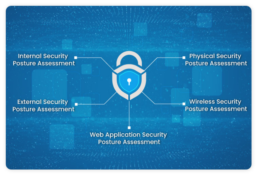Cybersecurity Posture Assessment Services
Organization needs comprehensive, in-depth IT security to secure their critical business assets from the evolving cyber threats. However, developing a robust security perimeter requires a complete understanding of the current security state of your network, applications, and systems.
Most organizations have limited insight into their cybersecurity posture and thus fail to identify the lurking vulnerabilities that could potentially lead to cyberattacks, and other security risks. Moreover, in the face of disruptive forces such as shifting threat landscapes and evolving digital technologies, the companies often fall at the risk of outmoded security posture.
A periodic Security Posture Assessment is imperative to plug current security vulnerabilities before a definitive cyber threat cripples the organization.
Security Posture Analysis from StealthLabs can assess your security capabilities across common industry standards. We uncover the flaws in your security posture, determine the IT risk level, and prioritize remediation procedures.
What is Cybersecurity Posture Analysis?
An organization’s cybersecurity posture refers to the overall security state of its network, systems, devices, and services. It includes the organization’s ability to secure critical assets, manage its defenses, and react and recover from attacks.
A Cybersecurity Posture Assessment (or Analysis) provides an overview of an organization’s internal and external security posture by assessing the vulnerabilities in the security controls, network devices, servers, systems, applications, and databases. The analysis validates how well the security architecture and strategies have been implemented and maintained.
Why Perform a Security Posture Analysis?
A security posture analysis helps you accurately mark where you are in terms of cybersecurity maturity and develop plans to better manage risks in the face of cyber uncertainty. It helps you:
Gain Visibility
Get an overview of your security team's discrepancies, skills, and underlying weaknesses that can put the organization at risk.
Align Security Strategy with Business Goals
Build an optimal security strategy for your organization's business functions, operations, objectives, and expectations.
Prove ROI
Determine the efficacy of your security controls, define exactly where to invest, and demonstrate the value of your investment.
Optimize Business
Pinpoint the worst threats with a detailed view of your network vulnerabilities, form a defense strategy, and avoid unexpected business interruptions.
Stay Compliant
Deploy effective security mechanisms to comply with applicable regulations and avoid penalties and repercussions.
How Can StealthLabs Assess Your Security Posture?
-
Penetration testing
to discover exploitable vulnerabilities in your systems, network, and web applications. -
Social engineering detection
to assess your organization’s ability to detect and respond to phishing attacks. -
Firewall configuration analysis
to detect unsafe configurations in your organization's firewalls and recommend changes to optimize security. -
Software code assessment
to discover security vulnerabilities, bugs, and violations within the software's source code.
-
Threat detection report
includes a summary of findings with insights into the observed attacker trends in your industry. -
IT auditing
to gain an insight into potential security gaps in your IT infrastructure. -
Security posture roadmap and recommendations
to improve effectiveness across all the relevant critical security domains.
Our Approach to Cybersecurity Posture Assessment
At StealthLabs, we follow a four-step approach to analyze your organization’s cybersecurity posture – plan, review, assess, and report.
Plan
Even before initiating the security program assessment, thorough planning is required to validate the scope of the assessment. Determine the resource requirements, identify key stakeholders, and outline a realistic work plan to obtain an insight on your current security stance.
Our security experts will work closely with your organization to create a detailed work plan that includes a defined objective, scope, limitations, required resources, schedule, and deliverables.


Documentation review
We work with you to document a system description, define the concept of operation, and determine the target level of residual risk. Our security experts will conduct a complete review of documentation, including security architecture, policies, procedures, and risk management plans.
Assess
During this assessment phase, we conduct the following steps:
- Internet exposure assessment
- Auditing and analysis of findings
- Statement of Sensitivity (SOS) to cyber attack
- Defining security posture based on findings
- Analysis of the cybersecurity framework
- Threat assessment
- Assessing the adequacy of current security controls
- Prioritizing remediation plan


Report
Our experts will submit a draft report with all the above-identified deliverables for your review. After due consideration of your feedback, we will deliver the final report on your cybersecurity posture.
StealthLabs Security Posture Assessment Services
We provide five types of security posture assessments that address different functional domains. The services can be offered independently or together based on your business objectives:
- Internal Security Posture Assessment
- External Security Posture Assessment
- Web Application Security Posture Assessment
- Wireless Security Posture Assessment
- Physical Security Posture Assessment

Why StealthLabs?
StealthLabs can help you critically assess your organization-wide security program, measure your incident response capabilities, discover the weak links in security control, and create an effective security strategy. With over a decade-long industry presence as a global Information Security Service and Solutions provider, we have the experts, methodologies, and tech to help you assess, quantify, prioritize, and manage known and emerging risks.
